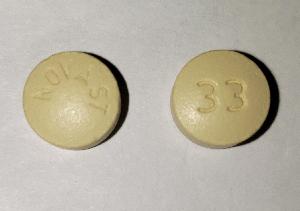Nifedipine and Alcohol/Food Interactions
There are 4 alcohol/food/lifestyle interactions with nifedipine.
Nifedipine Alcohol (Ethanol)
Moderate Drug Interaction
NIFEdipine and ethanol (alcohol) may have additive effects in lowering your blood pressure. You may experience headache, dizziness, lightheadedness, fainting, and/or changes in pulse or heart rate. These side effects are most likely to be seen at the beginning of treatment, following a dose increase, or when treatment is restarted after an interruption. Let your doctor know if you develop these symptoms and they do not go away after a few days or they become troublesome. Avoid driving or operating hazardous machinery until you know how the medications affect you, and use caution when getting up from a sitting or lying position. It is important to tell your doctor about all other medications you use, including vitamins and herbs. Do not stop using any medications without first talking to your doctor.
Nifedipine Multivitamins With Minerals
Moderate Drug Interaction
Using NIFEdipine together with multivitamin with minerals can decrease the effects of NIFEdipine. Talk with your doctor before using NIFEdipine and multivitamin with minerals together. You may need a dose adjustment or need your blood pressure checked more often if you take both medications. It is important to tell your doctor about all other medications you use, including vitamins and herbs. Do not stop using any medications without first talking to your doctor.
Nifedipine Food
Moderate Food Interaction
You should avoid or limit the consumption of grapefruit and grapefruit juice if you are receiving treatment with NIFEdipine. Grapefruit juice can significantly increase the blood levels and effects of medications like NIFEdipine. You may be more likely to experience side effects such as headache, low blood pressure, irregular heartbeat, swelling, and fluid retention. Talk to your doctor or pharmacist if you have any questions or concerns. It is important to tell your doctor about all other medications you use, including vitamins and herbs. Do not stop using any medications without first talking to your doctor.
Switch to professional interaction data
Nifedipine High Blood Pressure (Hypertension)
Major Potential Hazard, High plausibility
nifedipine - hypertension
For the long-term treatment of hypertension, only the extended-release formulations of nifedipine should be used. The US National Heart, Lung, and Blood Institute and the FDA Cardiovascular and Renal Drug Advisory Committee have issued warnings against the use of immediate-release nifedipine for this purpose based on review of three epidemiologic studies of patients with hypertension and unstable angina who were treated with calcium channel blockers (CCBs) and at least two meta-analyses of randomized, controlled trials that included patients receiving CCBs. Two of the case-control studies found an increased risk of myocardial infarction (MI) in patients taking immediate-release nifedipine, although the third did not. The use of immediate-release nifedipine (orally or sublingually) is also contraindicated for acute reduction of blood pressure. Profound hypotension, acute myocardial infarction, and deaths have been reported when nifedipine was used in this manner.
Switch to professional interaction data
Nifedipine drug interactions
There are 623 drug interactions with nifedipine.
Nifedipine disease interactions
There are 9 disease interactions with nifedipine which include:
- aortic stenosis
- cardiogenic shock/hypotension
- coronary artery disease
- liver disease
- hypertension
- myocardial infarction
- CHF/AMI
- renal dysfunction
- GI narrowing
More about nifedipine
- nifedipine consumer information
- Check interactions
- Compare alternatives
- Pricing & coupons
- Reviews (161)
- Drug images
- Side effects
- Dosage information
- Patient tips
- During pregnancy
- Support group
- Drug class: calcium channel blockers
- Breastfeeding
Related treatment guides
Drug Interaction Classification
| Highly clinically significant. Avoid combinations; the risk of the interaction outweighs the benefit. | |
| Moderately clinically significant. Usually avoid combinations; use it only under special circumstances. | |
| Minimally clinically significant. Minimize risk; assess risk and consider an alternative drug, take steps to circumvent the interaction risk and/or institute a monitoring plan. | |
| No interaction information available. |
Further information
Always consult your healthcare provider to ensure the information displayed on this page applies to your personal circumstances.


